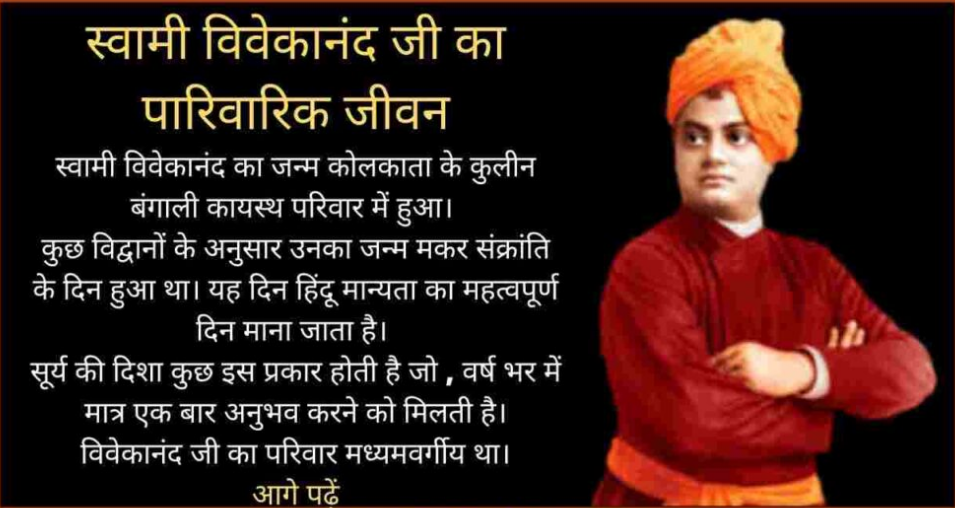Swami vivekananda essay : Swami Vivekananda was a great Hindu saint and leader who founded the Ramakrishna Mission and Ramakrishna Math. We celebrate National Youth Day on 12 January every year on his birthday. He was a wonderful child with spiritual thoughts.
Swami vivekananda Essay : Long and Short Essay
His education was irregular, but he completed his BA degree from Scottish Church College. After meeting Sri Ramakrishna, his religious and saintly life started and made him his guru.
After this he led the Vedanta movement and introduced the philosophy of Indian Hinduism to the western countries.
Swami vivekananda biography :
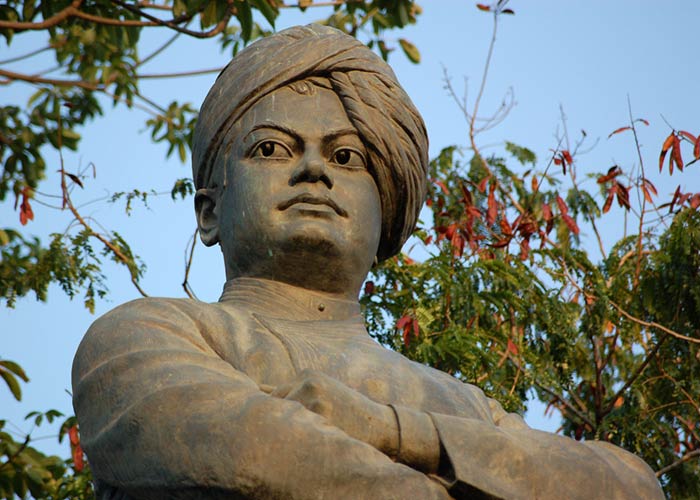
Birth :
Narendranath Dutt
12 January 1863
Calcutta
(now Kolkata)
Death :
swami vivekananda death date :
4 July 1902 (age 39)
Belur Math, State of Bengal, British Raj
(now in Belur, West Bengal)
master/teacher : Sri Ramakrishna Paramhansa
swami vivekananda jayanti : 12 Jan – Swami Vivekananda Jayanti 2022, 2023 and 2024
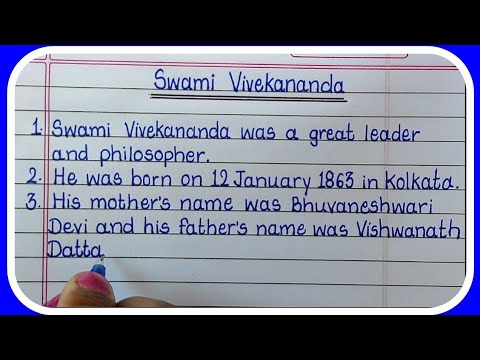
swami vivekananda wife : ✘ No, Swami Vivekananda did not marry
swami vivekananda Essay 1 (300 words)

Introduction
Swami Vivekananda is one of the great men born in India. Through his great works, he brought great fame to Sanatan Dharma, Vedas and Gyan Shastra in the western world and gave the message of peace and brotherhood to the people all over the world.
Early Life of Swami Vivekananda
A world-renowned saint, Swami Vivekananda was born on 12 January 1863 in Calcutta. He was known as Narendra Nath Dutt in his childhood.
His birth anniversary is celebrated every year in India as National Youth Day. He was one of the eight children of Vishwanath Dutt, a Calcutta High Court lawyer, and Bhuvaneshwari Devi.
He was a smart student, however, his education was very irregular. He was a very religious and spiritual person and was popular for his knowledge of Sanskrit.
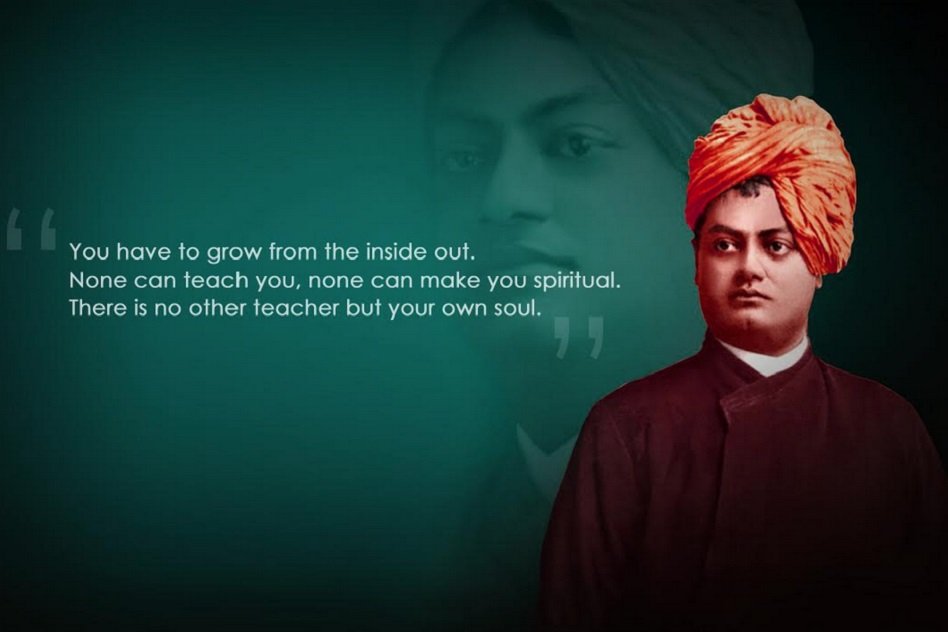
Who was the Guru of Swami Vivekananda?
Swami Vivekananda was a truth teller, a good scholar as well as a good sportsman. He was religious in nature since childhood and was very worried about the attainment of God.
One day he met Sri Ramakrishna (priest of Dakshineswar Kali temple), then there was a change in him due to the spiritual influence of Sri Ramakrishna.
After accepting Sri Ramakrishna as his spiritual guru, he came to be called Swami Vivekananda.
In fact, Swami Vivekananda was also a true guru devotee because even after getting all the fame, he always remembered his guru and brought glory to his guru, establishing the Ramakrishna Mission.
Swami Vivekananda’s Chicago Speech
Whenever there is talk about Swami Vivekananda, his Chicago speech is definitely discussed because that was the moment.
When Swami Vivekananda introduced people to spirituality and Vedanta, changing the attitude of people about Hinduism all over the world through his knowledge and words.

In this speech, he introduced the world to the subject of India’s Atithi Devo Bhava, tolerance and universal acceptance.
He told that just as different rivers meet in the sea in the end, similarly all the religions of the world lead to God in the end and to stop the fanaticism and communalism spread in the society,
we all have to come forward because without harmony And the full development of the world of brotherhood and humanity is not possible.
Conclusion
Great men like Swami Vivekananda are born only once in centuries, who work to inspire people continuously even after their lives.
If we follow what they have been told, then we can be successful in removing all kinds of bigotry and evil from the society.
Don’t Miss : 15 august Images
swami vivekananda essay 2 (400 words)
Introduction
Swami Vivekananda is one of those great persons, who did the work of illuminating the name of India all over the world.
Through his Chicago speech, he provided information about Hindutva to people all over the world, along with this his life is also a lesson for all of us.
biography of swami vivekananda
Swami Vivekananda was born on 12 January 1863 in Shimla Pallai, Calcutta. His father’s name was Vishwanath Dutt who worked as an advocate in the Calcutta High Court and mother’s name was Bhuvaneshwari Devi.
Swami Vivekananda was one of the main followers of Sri Ramakrishna Paramhansa. His birth name was Narendra Dutt, who later became the founder of Ramakrishna Mission.
He was a person of Indian origin who introduced the Hindu philosophy of Vedanta and Yoga to Europe and America.
He revived Hinduism in modern India. His inspirational speeches are still followed by the youth of the country.
He introduced Hinduism to the World Religions General Assembly in Chicago in 1893.

Swami Vivekananda was influenced by his father’s rational mind and mother’s religious nature. He learned self-control from his mother and later became an expert in meditation.
His self-control was truly amazing, using which he could easily enter a state of samadhi. He developed remarkable leadership quality at a young age.
He came in contact with Sri Ramakrishna after getting acquainted with the Brahmo Samaj at a young age.
He started living in Boranagar Math with his sages and brothers.
In his later life, he decided to visit India and started traveling from place to place and reached Triruvantapuram, where he decided to attend the Chicago Dharma Conference.
He became popular all over the world after delivering his impressive speeches and lectures at many places. He died on 4 July 1902.
It is believed that he went to his room to meditate and asked no one to disturb him and died during meditation.
Conclusion
Swami Vivekananda illuminated the name of India and Hinduism all over the world through his speeches.
He was a person from whose life we can always learn something or the other. This is the reason why it remains so popular among the youth even today.
Swami vivekananda essay 3 (500 words)
Introduction
Narendranath, who was born in a normal family, became Vivekananda on the strength of his knowledge and brilliance.
Through his works, he did the work of illuminating the name of India across the world. This is the reason why he is the inspiration of people even in today’s time.
Great man of India – Swami Vivekananda
Swami Vivekananda was born on 12 January 1863 in Calcutta, on the occasion of Makar Sankranti, in a traditional Kayastha Bengali family.
Swami Vivekananda’s childhood name was Narendranath Datta (also known as Narendra or Naren).
He was one of the nine children of his parents (father Vishwanath Dutt was a lawyer in the Calcutta High Court and mother Bhuvaneshwari Devi was a religious woman).
He grew into the most effective personality under the father’s rational mind and mother’s religious temperament.
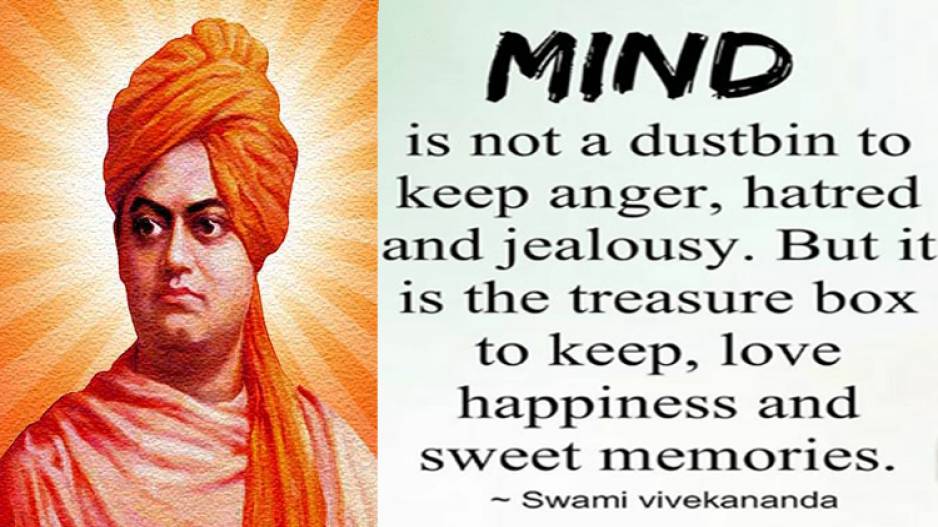
He was a spiritual person from childhood and used to meditate in front of Hindu God idols (Lord Shiva, Hanuman etc.).
He was very mischievous in his childhood and was out of control of his parents.
He was called a ghost by his mother, according to one of his statements, “I prayed to Lord Shiva for a son and he sent me one of his ghosts.”
He was admitted to the Chandra Vidyasagar Mahanagar Sanstha to study in 1871 (when he was 8 years old) and to the Presidency College in 1879.
He studied Western logic, European history, Western philosophy, Sanskrit scriptures and Bengali literature.
Thoughts of Swami Vivekananda
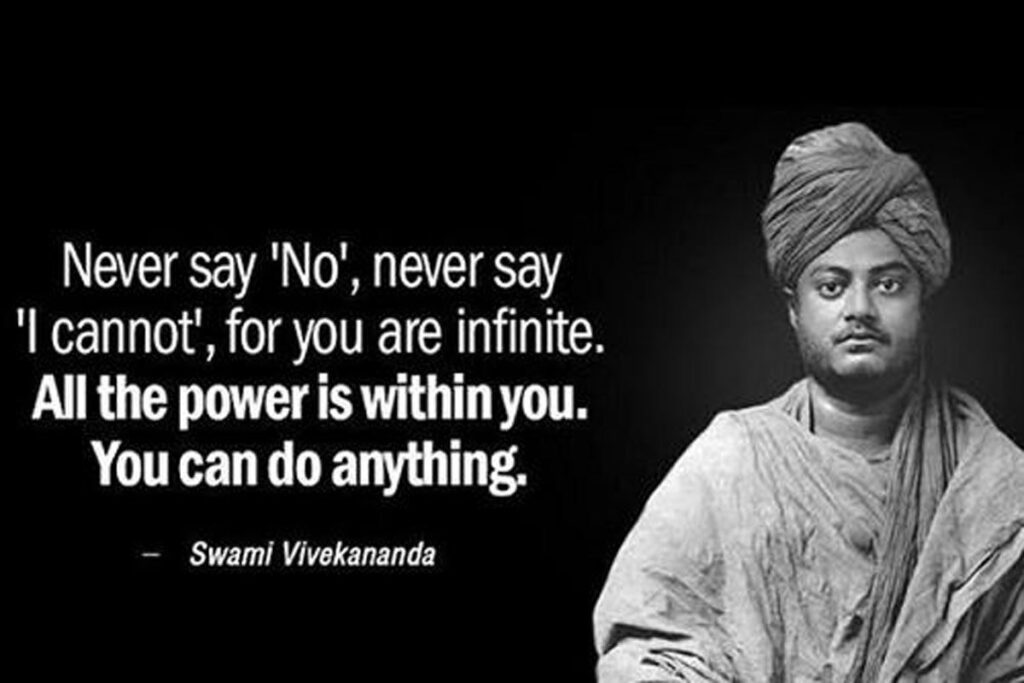
He was a very religious person and was interested in Hindu scriptures (Vedas, Ramayana, Bhagavad Gita, Mahabharata, Upanishads, Puranas etc.).
He was called “Narendra is indeed a genius” by William Haste (principal of the General Assembly).
He was very enthusiastic about Hinduism and was successful in creating new thinking about Hinduism among the people both inside and outside the country.
He became successful in promoting meditation, yoga, and other Indian spiritual paths of self-improvement in the West.
He attracted the attention of many Indian leaders through his nationalist ideas.
His ideas worked to make people understand the true meaning of Hinduism and also changed the attitude of the western world towards Vedanta and Hindu spirituality.
Chakravarti Rajagopalachari (the first Governor General of independent India) said that Swami Vivekananda was the person who saved Hinduism and India for his actions.
His influential writings inspired many Indian independence activists; Like- Inspired Netaji Subhash Chandra Bose, Bal Gangadhar Tilak, Arvind Ghosh, Bagha Jatin, etc.
It is said that on July 4, 1902, he gave up his life while meditating for three hours at Belur Math.
Conclusion
Despite all the adversities in his life, Swami Vivekananda never deviated from the path of truth and worked to impart knowledge to the people throughout his life.
With these thoughts, he influenced the whole world and did the work of illuminating the name of India and Hindutva.
Basic Principles of Swami Vivekananda’s Philosophy of Education
Following are the basic principles of Swami Vivekananda’s philosophy of education:
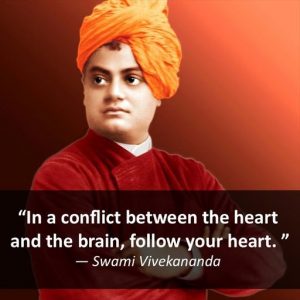
- Education should be such that the physical, mental and spiritual development of the child takes place.
- Education should be such that the character of the child is formed, the mind is developed, the intellect is developed and the child becomes self-reliant.
- Equal education should be given to both boys and girls.
- Religious education should not be given through books but through conduct and rituals.
- Both temporal and transcendental subjects should be given place in the curriculum.
- Education can be obtained in the Guru Griha.
- The relationship between teacher and student should be as close as possible.
- Education should be promoted and spread among the general public.
- Technical education should be arranged for the economic progress of the country.
- Humanitarian and national education should start from the family itself.
Important dates
- January 12, 1863 : Born in Calcutta
- 1879: Admission to Presidency College
- 1880: Entered the General Assembly Institution
- November 1881: First meeting with Sri Ramakrishna
- 1882-86 : Associated with Sri Ramakrishna
- 1884: Graduated examination passed; father’s death
- 1885: Last illness of Sri Ramakrishna
- August 16, 1886: Sri Ramakrishna died
- 1886: Establishment of Varaha Nagar Math
- January 1887: Formal vow of sannyasa at Varaha Nagar Math
- 1890-93 : India tour as Parivrajak
- December 25, 1892 : In Kanyakumari
- February 13, 1893: First public lecture at Secunderabad
- May 31, 1893 : Leaves Bombay to America
- July 25, 1893: Arrived in Vancouver, Canada
- July 30, 1893: Arrival in Chicago
- August 1893: Harvard University Prof. meeting with john wright
- September 11, 1893: First lecture at the World Conference of Religions, Chicago
- September 27, 1893: Final lecture at the World Conference of Religions, Chicago
- May 16, 1894: Speech at Harvard University
- November 1894: Establishment of Vedanta Committee in New York
- January 1895: Religious classes started in New York
- August 1895 : in Paris
- October 1895 : Lecture in London
- December 6, 1895 : Back to New York
- March 22-25, 1896 : Back to London
- May-July 1896: Lecture at Harvard University
- April 15, 1896 : Back to London
- May-July 1896: Religious classes in London
- May 28, 1896: Meeting with Max Müller at Oxford
- December 30, 1896: From Naples to India
- January 15, 1897 : Arrival in Colombo, Sri Lanka
- 6-15 February, 1897 : In Madras
- February 19, 1897 : Arrival at Calcutta
- May 1, 1897: Establishment of Ramakrishna Mission
- May-December 1897: Visit to North India
- January 1898: Return to Calcutta
- March 19, 1899: Establishment of Advaita Ashram in Mayawati
- June 20, 1899: Second visit to the West
- July 31, 1899: Arrival in New York
- February 22, 1900: Establishment of the Vedanta Committee in San Francisco
- June 1900: Last class in New York
- July 26, 1900 : Leaves Europe
- October 24, 1900: Visit to countries like Vienna, Hungary, Kustuntunia, Greece, Egypt etc.
- 26 November 1900 : Left for India
- December 9, 1900: Arrival at Belur Math
- January 1901: Mayawati’s visit
- March-May 1901: Pilgrimage to East Bengal and Assam
- January-February 1902: Visit to Bodh Gaya and Varanasi
- March 1902: Return to Belur Math
- July 4, 1902: Mahasamadhi.
